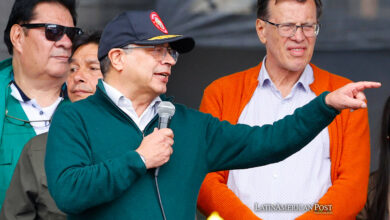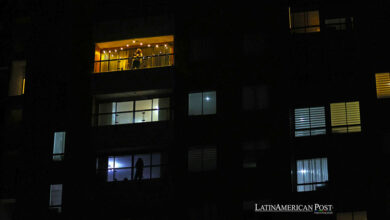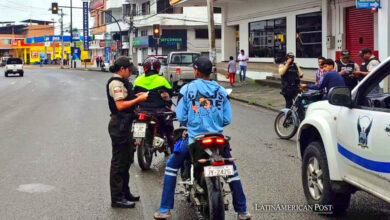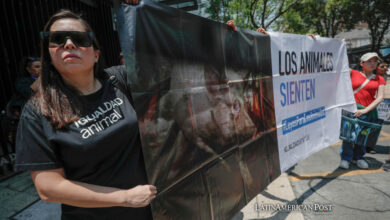Brazil’s Congress Challenges Presidential Veto on Indigenous Lands
Brazil's Congress has overturned President Lula's veto, reigniting tensions over Indigenous land claims and setting the stage for a critical Supreme Court showdown.

12/14/2023.- The Minister of Indigenous Peoples, Sonia Guajajara, participates in a demonstration in front of the National Congress in Brasilia (Brazil) to demand that Brazilian President Luiz Inácio Lula da Silva’s vetoes of the so-called Temporary Framework law for the demarcation of indigenous lands not be overturned. EFE/ Andre Borges
The Latin American Post Staff
Escucha este artículo
Leer en español: El Congreso de Brasil desafía el veto presidencial sobre tierras indígenas
a pivotal move, Brazil's Congress overruled President Luiz Inacio Lula da Silva's veto that had previously rejected an essential aspect of legislation restricting Indigenous land claims. This development signals a brewing conflict likely to culminate in a Supreme Court decision.
President Lula, who had earlier formed the first Ministry of Indigenous Peoples and promised to address pending land claims, vetoed the bill's central provision in October. This veto, overturned by Congress, was initially hailed as a significant triumph for Brazil's Indigenous population, estimated at 1.6 million. The vetoed provision sought to limit land claims to territories where Indigenous communities resided as of October 5, 1988, when Brazil's Constitution was enacted.
This issue has taken center stage against increasing land conflicts in Brazil. As the country's agricultural sector has flourished into a global leader, clashes over land rights have intensified. Indigenous communities across Brazil have been contesting lands occupied and developed by farmers, sometimes for several decades.
Congressional Farm Caucus Advocacy
The Congressional Farm Caucus, a strong proponent of the bill, argued that establishing a legal cut-off date for new reservations on these lands would bring much-needed legal clarity and potentially reduce deadly land conflicts. Opposition lawmaker Ciro Nogueira emphasized on social media that Brazil's Indigenous population does not lack land but needs support to develop and utilize their existing territories effectively.
On the other hand, Indigenous leaders and advocates stress that safeguarding their lands is crucial for preserving the Amazon rainforest, which plays a vital role in mitigating climate change. Celia Xakriabá, one of the two Indigenous members in Brazil's Congress, labeled the recent vote as a setback for the climate agenda.
Protests and Ministerial Support
In response to the Congressional decision, groups of protestors from various tribes gathered outside Congress, showcasing their cultural heritage through feathered headdresses and painted faces. They supported the presidential veto, warning that the farm lobby-backed legislation could escalate violent land disputes.
Amidst these protests, Indigenous Peoples Minister Sonia Guajajara voiced her support for maintaining President Lula's veto. She highlighted that the proposed deadline for land claims poses a direct threat to ancestral lands, which are integral to the survival and continuity of Indigenous cultures in Brazil.
Supreme Court's Role in the Ongoing Debate
The Supreme Court's previous ruling in September, deeming the deadline unconstitutional, adds another layer of complexity to the ongoing debate. With Congress's recent action to annul the presidential veto, the matter is poised to return to the Supreme Court for a decisive ruling.
This development reflects Brazil's intricate and often contentious relationship between Indigenous rights, environmental concerns, and agricultural interests. As the world's attention increasingly focuses on climate change and environmental preservation, the outcome of this legal battle will have far-reaching implications for Brazil's Indigenous communities and global environmental policy.
Also read: Devotion in Mexico City to Honor Our Lady of Guadalupe
The controversy encapsulates a broader struggle involving cultural preservation, legal rights, and economic interests. The eventual Supreme Court decision will not only determine the fate of Indigenous land claims. Still, it will also set a precedent for how Brazil navigates the delicate balance between protecting its Indigenous heritage and fostering its agricultural sector. As Brazil grapples with these complex issues, the international community watches closely, recognizing the global significance of the Amazon rainforest and the pivotal role of Indigenous communities in its stewardship.





